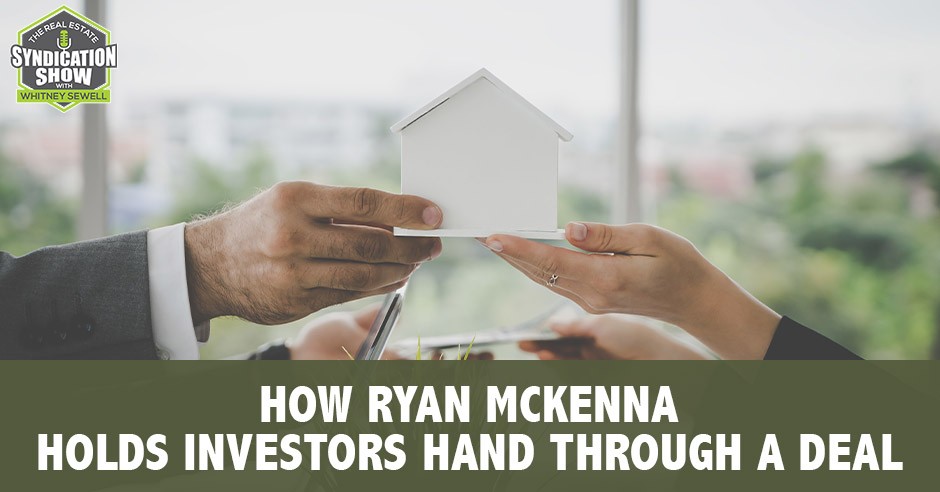Listen to the podcast here:
Ryan McKenna is a full-time real estate investor who founded McKenna Capital, a private equity firm that provides opportunities to become passive partners in a variety of fields in real estate. A former baseball player for Arizona State, he was first introduced to real estate syndication by his teammate whose father was an apartment syndicator. After his ITP diagnosis, he came across the book Rich Dad Poor Dad by Robert Kiyosaki, which then became his blueprint for his investing career. Now, Ryan manages McKenna Capital full-time which was just a dream then. In this episode, Ryan shares the importance of communication in striking up deals and how it’s been his mission to go out there and spread the word about real estate syndication.
Our Gracious Sponsor:
Are you wanting to learn how to gain financial freedom through having your own syndication business? Text LEARN to 474747 to begin to learn from one of the best in the industry, Vinney Chopra. Vinney came to the US with only $7 in his pocket, and now controls hundreds of millions of dollars of real estate he has acquired through multifamily syndication. He is now personally coaching others to do the same. Text LEARN to 474747 to begin your journey to starting your own syndication business! Vinneychopra.com
—
Watch the episode here:
How Ryan McKenna Holds Investors Hand Through A Deal
Our guest is Ryan McKenna. Thanks for being on the show, Ryan.
Thanks, Whitney. It’s a pleasure to be on here.
I’m happy to have you on the show. I’ve known Ryan a little while now and I’ve seen a lot of the work he’s been doing. His business is growing and he’s doing some big stuff. It’s great to have him on and be able to share with the audience. He is a full-time real estate investor and Founder of McKenna Capital, a private equity firm that provides opportunities for investors to become passive equity partners in institutional, quality and recession resistant real estate. Focusing on value-add multifamily, self-storage and manufactured home parks, McKenna Capital has helped investors allocate capital across 5,000-plus units with a combined asset value of over $500 million. Thank you, Ryan, for being on the show. You’ve accomplished a lot and we want to hear about it. Tell the audience who you are and let’s get into how you got to where you are.
Thanks, Whitney. A little background on me. I live right outside of Chicago. I’ve got a wife and two daughters. I first learned about real estate syndication back in the early 2000s when I was playing baseball at Arizona State. A teammate of mine, his father was an apartment syndicator. When I had some free time, I started chatting with him. I was interested in what he was doing and he got me introduced to the syndication model and pulling together a bunch of investors by large apartments. I was hooked to it as something that I thought someday I want to do that. I went through a series of events in my life that got me into the real estate syndication business.
A lot of that happened when my baseball career didn’t work out. I got sick towards the end of my sophomore year and got diagnosed with ITP. It was a blood platelets disorder that was very similar to leukemia and lupus. I’m completely fine now but during that time, I spent a lot of time in the hospital and did some soul searching where I knew baseball wasn’t going to work out and the doctors told me, “You will never play again.” In the back of my mind, I had to start thinking about what my life was going to look like and be like. Around that time, as I was talking to this apartment syndicator, I came across the Rich Dad Poor Dad book by Robert Kiyosaki. That became the blueprint for my investing career and what I wanted to do and how I wanted to design my life one day to have a bunch of assets that produce cashflow and that can grow my wealth better in a tax-efficient manner.
Fast forward many years, I’m now living that dream that back when I was in the hospital, I was trying to figure out what it is I wanted to do. I finally got there and a lot of learning along the way. I started off with the single-family homes to dip my toe into that type of business. I quickly learned if I wanted to scale, I had to get into multifamily syndication. That’s where my personal investing started and where I was able to leave the corporate world and pursue McKenna Capital full-time, not only investing in a lot of syndicated deals but raising capital. I love what I’m doing and I’m happy to share more on where we are and what we’re looking to do.
Congratulations to you for doing this full-time and making it happen. I know it’s taken a lot of hard work getting there, especially when you’re working full-time as well. You started with the single-family homes. Why move into the syndication space? Elaborate that a little bit.
The single-family home is maybe an easier way to get into real estate investing. I was trying to look at how many homes that we need to acquire to get to that financial freedom number. After a few single-family rentals, I learned what I liked about the business, but I also learned what I didn’t like about the business. For someone who wants to do passive real estate investments, the single-family route wasn’t passive to me. It was a lot of work. I was essentially like the property manager as well. I got those phone calls late at night. I had to deal with a lot of things that made it more of an active investment. At the end of the day, the returns were nowhere near what I’m getting for doing nothing after I funded a deal or made an investment.
[bctt tweet=”People are either going to like you or not, but be someone that’s looking out for your investors.” username=””]
That was shocking to me and I’m glad I learned it early on. For the deals that I’m doing, it’s much easier. There’s less risk involved because back when I was doing the single-family homes, I’m putting more of my capital into that deal. I’m responsible for a larger portion of that investment. To be honest, I was probably less experienced than most because I was doing this for the first and second time of owning property. There was some risk involved and it turned out okay, but I quickly realized that if I wanted to be in this long-term and I wanted to grow my wealth, I couldn’t scale with the current single-family rental investments I had.
Your focus now is building an investor database. You are able to raise large amounts of capital. You are building a great business and a great name for yourself. Get us started with how you got started. I know a lot of our audience are trying to do the same thing and they dream about being in your seat. When you first started raising capital or when you first started talking to investors, how did that begin? How did you learn the ins and outs? How did you educate yourself? Give us maybe a couple of key ways that you educated yourself early on.
Going back to what I learned early on back when I was in college, I started reading every book I could on real estate investing because I knew that this was my path to financial freedom. I was going to figure out a way to do it. Eventually, I started becoming a passive investor in other syndicated deals. I did my first five deals with a mentor that I mentioned, my teammate’s father. I was studying how they were putting the deals together. I’m getting a good sense for the different markets they were focused on and the different returns I could get from investing in these types of deals. I started doing other deals with other syndicators because I had every intention of wanting to go and do my own deals at some point. I got into about twelve opportunities as a passive investor.
Along the way, I had friends, family and coworkers asking me more and more about these deals I was investing in. I knew there was a lot of interest, but I never had a way to help bring them into these opportunities because a lot of them were through relationships I had and a lot of people didn’t know much about the operators. I found out about the ability to start raising capital for some of these projects. That’s when my business took off because now I had built a pretty good base of people in my network that were interested in investing in multifamily syndications. I could now bring them into the deal. By partnering with other operating partners, I had some access to some great deal flow and the two together is what allowed the business to take off.

We’ve had a tremendous amount of success over the last few months or so. We’ve done over twenty syndicated deals and I’ve got a very strong investor base. It might look like this happened overnight, but it didn’t. My investors are coming from fifteen to twenty years of relationships and people that I’ve known for a long time. When I got into the capital raising business, I didn’t just say, “I got a deal. Do you want to invest?” It was many months in advance of letting them know what I was pursuing and what I was doing. I was sharing a little bit more about this type of investment. When that first opportunity came along, they already had several conversations with me. They were comfortable and they were able to quickly move on that opportunity if they were interested in investing in it.
How did you start to grow your network? I know you said most of those relationships you had for fifteen to twenty years or some long-term. I speak to somebody who doesn’t have that network coming into this business maybe but how did you start to grow your network?
It started with friends, family, coworkers but then I started looking for ways that I could reach an investor base that would have an interest in investing in these types of deals. Typically, it’s high net worth individuals. We’re working mainly with accredited investors. I looked for areas that I could run across, meet and network with people that I thought might have an interest. I also do Angel investing. I’m part of IrishAngels. It’s a great network where there’s a ton of accredited investors and entrepreneurs. That was my way to associate and surround myself with other people that were interested in investing. We’re investing in businesses, but they also invest in real estate. I do a lot in the Angel investing world and work with a lot of entrepreneurs there who like the passive investing deals that we’re putting together.
I also worked with a lot of investors. This is our first investment and a lot of education goes into this and having them become aware of these types of opportunities. Most people have no idea that this type of investment opportunity exists. It’s been my mission to go out there and spread the word because I want people to know that there are alternatives to the stock market out there and that there are great ways to grow your wealth and to create those passive income streams. Early on, I was talking to everyone and I was doing phone calls, emails, coffees multiple times a day and it spreads from there. It took a little while but eventually, I started to generate a lot of interest. When people started investing with me, they had friends and family that were interested. They would share it and I would connect with them and then it snowballed. I put a lot of time into my network reaching out proactively to have that initial conversation. I always took the approach that this was never about a sales pitch. It was never pushy. It was as simple as, “If I was going to share this opportunity with you, it’s because I think highly of you. I think you’d have an interest at least in learning more about it.” That was my approach.
[bctt tweet=”There will be some bumps along the way that we’re going to have to deal with. We just have to make the most out of every situation.” username=””]
I would hope someone would think of me as that person if they had a great opportunity. There’s no pressure. There was no need for them to jump into something right away which is a slow, methodical, educational approach. You marry that with a great opportunity or multiple opportunities and then there’s your business. You take it from there and you keep doubling down on the areas that work well for you. Even though we’ve had a lot of success, I’ve not taken my foot off the pedal here. I continue to network every single day. I continue to grow the investor base. I continue to help educate because I know that there are many people out there that are appreciative that they can learn about these types of investments. I get great satisfaction talking about it.
How are you educating your investors? What are you doing exactly to educate them?
A perfect example would be to be on a show like this. This is a great show, great audience and my investors will love to hear more about what you’re doing. I know you have a lot of great guests on. Through podcast interviews. I write several blogs. I try to do a couple of months. Industry events. I try to go and connect not only with other investors but other operating partners. This whole real estate investing ecosystem, there are many people involved and I want to be in the middle of it in a way and continue to keep building relationships. That’s where my presence is. I feel like from a thought leadership perspective, it’s podcasts, blogs, anything with social media trying to build your brand so people know who you are and what you do. If they don’t, they will never have the opportunities and maybe come across this or to have a conversation with you about it.
You’re putting yourself out there and it gives you content to send to your investors as well, doesn’t it?

Yeah, it’s a great way to get a lot of people to learn different things. Some people like to read. Some people like to see a video or listen to a podcast. I tried different things and you learn from previous experiences what works and what doesn’t, but you’ve got to at least go out and try everything to know. You will get a good sense for where you should focus your efforts going forward.
What kind of CRM are you using?
I use Pipedrive to manage my investor database but MailChimp is my lifesaver as far as putting all the deals together and being able to reach a large audience. It manages everything that we put together in an easy to use automated systems. The investors have liked that. They can get everything in one email and see everything and it’s all linked up. It allows me to repeat a lot of the announcements in the deals we put together. It’s saved my life in a way from an efficiency standpoint.
Tell me about your follow-ups with the investors. How are you keeping the relationships active?
[bctt tweet=”Trying to do everything the right way, being proactive, and trying to find the best relationships will put you in a good spot.” username=””]
A lot of this is through making a note to everyone that I’ve talked to. If I haven’t talked to, I try to reach out and strike up even if it’s a fifteen-minute conversation. I try to keep them in the loop with what we’re doing because I know that timing is everything. There are investors that have no intention of investing right now in any of our deals, but they want to get educated because they want to learn this. They want to take their time and they might become an investor next year or two years down the road. That’s the beauty of what we’re doing is that there is no pressure. If you want to invest in a deal, that’s great. You can but there are a lot of people that want to learn. Having a lot of deals that we’re working on and we’ve been doing about, I used to say a deal a month, but it’s been about two lately.
They get to learn and see the different opportunities and it’s a great way for them to ask questions. Either they will email me or we will set up a time for a call. I could walk them through the type of the investment opportunity that maybe they’ve seen or that we’re targeting. They learn that way and whenever they’re ready, they will reach out and invest. It’s this constant being in front of them, being available, educating them, trying to put out good content. Sometimes it’s just sharing news articles of what’s going on in our industry too. I have a monthly newsletter that usually highlights the latest industry trends or news that we’re seeing out there. It will also showcase some of the podcasts and the blogs that may have been written and also a summary of deals that we’re working on or emerging opportunities. It gives them an overview of everything on a monthly basis. It’s a great cadence for them that want to keep in the loop but not be involved in every opportunity that comes out.
It’s important to stand in front of them for sure. How do you stand out among the other capital raisers or operators that are raising capital for deals? What sets you apart or ways maybe that you stand out or communicate or things that you do?
From the outside, people could look at it and feel like, “You all do the same thing. It’s confusing.” I want my investors to know that I’m doing this because I personally believe in it. I’m investing in the deals. I’m looking at this through the investor lens because essentially that’s what I did. I’m following my footsteps here where I was able to walk away from the corporate world after investing in several syndicated deals. I more or less want others to have the same ability to invest in the deal. Whatever the reason is for them, I want them to know that I’m looking at this through their eyes as well. We want to pick the right partners and have long-standing partnerships in place and try to generate the highest returns that we can. It’s important to be there and also communication is huge in this industry. I get a lot of great feedback, “You’re always willing to talk with us even if we’re not ready right now.” Even if they think it might be a dumb question. There’s no dumb question in my mind. A dumb question is not even asking.

I love what I do and I want to help other people and they feel that. In this business, trust is a big deal. That’s what allowed me to get off to a quick start because I had built a lot of relationships in the previous working fields that I was in. Throughout the years, I’ve always maintained pretty good contact with everyone. Trust is a big factor here in someone’s willingness to invest with you because if they don’t know you and like you, they’re probably not going to invest with you. If they can get comfortable with it and they think you’ve got a nice, easy and smooth process, you’re going to be the one staying in contact with them essentially, maybe holding their hand through the deal. That type of service and that level of detail that we go through and putting our deals together, we’ve had great feedback. I don’t think it’s anything that anyone couldn’t replicate but I would like to think that people couldn’t replicate me in a sense that I am who I am. Either they’re going to like me or not but I’m someone that’s going to be looking out for my investors.
I’m someone that wants to do this long term and provide for my family like they want to. I tell all my investors, “This is one big partnership we’re in.” It’s like you’re going back to my sports days. This is my sports team. We’re all on this together. We’re all a small piece of a bigger asset that we’re acquiring. There’s this feeling of like, “We’re in this together,” and they like that. I try to make that stand out because it’s not just me. I wouldn’t have a business if it wasn’t for investors that were interested in talking with me about the latest deals we’re looking at. I owe a lot of credit to them. They also pushed me because I’ve got some smart and sophisticated investors and I get great feedback. I’ve got several that it’s almost like having my own underwriting team because they will give me feedback on the deals that we’re looking at. It’s important to include them and involve them so that they can help you get better at what you’re doing.
I like your analogy too. You’re holding their hand through the deal and being available. That is some great quality. What about operators, like selection? How are you picking who you’re going to partner with? Because you’re partnering with this team. You’re becoming part of this team and operating inside of this business that somebody else has essentially created but you’re coming in and you’re trusting them. How are you selecting those teams?
That’s very important to our business model. We get asked all the time to raise capital for many deals and 99% of the time we’re saying no because of our process in partnering with an operating partner. We’re not looking to do a one-off deal. We’re not transactional. We want to build a long-term relationship. Before we even look at a deal, we want to get to know that operating partner and get to know who they are personally, their character, their integrity. We got to feel like they’re going to be a good fit for us to grow together because we’re planning on doing multiple deals with them. Once we’ve vetted out that and we’re also not only personally talking with them, meeting with them and discussing things. I’ve got a lot of contacts in the industry that know of them and maybe have done deals with them, investors that have invested with them before. There are a lot of different factors that go into finding the right operating partner.
[bctt tweet=”When you’ve grown enough, start outsourcing some things so you can spend more time with investors and operating partners.” username=””]
Once we get over that, then we focus on the deal when they have that first opportunity. Usually, if they’ve checked all the boxes on the front end, the deal is secondary to us. We look if that fits within our criteria of what we’re seeing out in the market. We do our due diligence and then we move forward with the investors. As we continue to evolve, I try to balance out the demand that we have from the investor base with the number of opportunities. We’ve got eight operating partners that we work with. There are definitely times where we’re busier than others. I’d rather have fewer operating partners and do more deals with them because all it takes is one bad deal and you essentially could jeopardize your whole business or your reputation.
My reputation is tied to the performance of these deals and I want to make sure that we’re doing the right things. If there’s a problem, we’re very transparent. We let everyone know where things stand right away. Building that trust with investors, that’s what they expect. That’s what I try to deliver because no one’s perfect in this world here. We all can try to do everything the right way and be proactive and try to find the best relationships. It will put us in a good spot but I’m also not naïve to think that there won’t ever be some bumps along the way that we’re going to have to deal with and make the most out of that situation.
What are some ways that you’ve improved your business that we can apply to ours?
I feel like every day I’m trying to do something to improve my business and make it better. I’m constantly trying to redesign and upgrade my website from the standpoint with Google and SEO and having people find my business if they’re doing a general search. That’s where I’m spending a lot of time. I’m talking with a couple of marketing companies to help me with that from a branding perspective. A lot of this, I started and I built on my own. I’m getting to the point where we’re growing enough that I need to start outsourcing some things so I can spend more time with the investors and the operating partners.

From the branding awareness standpoint, I’m working with people to help take some load off my plate. I’m looking into executive assistant to allow me to push off some of the more administrative tasks. That’s where I’m at with how I’m trying to make the business better. For me, it’s important to make myself available. If we get busier, you take that into consideration, “What can I outsource?” Because the investors are going to want to talk with you. They’re going to want you to have time for them. I don’t ever want to get in a position where I’m too busy for them. I’m constantly monitoring that. A lot of this is my time management that comes into play here because you’ve got to manage everything you’re doing. My family’s very important to me and I want to make sure that I have time for my family too. It’s being smart about how you build your business and as you grow, you’ve got to look to bring on help. That’s where I’m at right now.
That’s a must and no doubt it will change your business. That’s for sure. What’s the number one thing that’s contributed to your success?
Probably my passion with what I bring to this. This has been fifteen to twenty years in the making for me to finally get to this point. I absolutely love what I’m doing. It does not feel like work to me. I told someone, “I’ve done a lot of different things from a business perspective. I’ve had other businesses. I wanted to be a Major League baseball player but that didn’t work out. This is the first time I’m doing something where I feel like I was born to do this.” It’s a great feeling because I know it doesn’t happen overnight and a lot of people will probably work for the rest of their life trying to get there. I feel lucky that I’m here. That has contributed to my success because I can continue to keep helping and educating others but also be doing it in a way where I’m not getting burned out. I love what I do. I love having investor conversations. I love the partnerships too. That’s another thing that has allowed me to accelerate my business. I didn’t do this by myself. I had great partners along the way, great mentors, great operating partners. That’s important because that will take your business to a whole other level. It will give you that credibility and that experience that some starting out might not have. When you couple that with your passion behind it all, it’s going to be a successful journey.
How do you like to give back, Ryan?
[bctt tweet=”You’ve got to manage everything you’re doing and be smart about how you build your business.” username=””]
I give back financially to a lot of different organizations that are near and dear to me but the biggest way I give back is through my time. I am very busy managing a lot of different things. I always make time for investors. I always make time to help someone out that got questions, not only from a real estate syndication perspective but being part of IrishAngels. I’ve helped out there with other entrepreneurs that are looking to help grow their business. They’re looking for guidance and it’s being there for them and helping them based upon the experiences you had in your life and sharing what’s worked and what hasn’t worked. I learned a lot from mentors and other people that have brought me under their wings. I’m trying to do the same for others out there because it’s all about giving back and that’s how we all grow together.
Ryan, thank you again for being on the show. Tell the audience how they can learn more about you and get in touch with you.
They can go to McKennaCapital.com. That’s our website. They can see there everything they would on us. We’re on Instagram, Facebook, LinkedIn, Twitter, any of those social media mediums, they can follow us as well and get more information on what we’re up to.
Ryan, thanks again for your time and expertise and sharing with me and the audience. I appreciate the audience being with us. I hope you will go to The Real Estate Syndication Show on Facebook and join us there and get active in the group and learn from experts like Ryan so we can grow our businesses together. We will talk to each of you soon.
Important Links:
- Ryan McKenna
- McKenna Capital
- Rich Dad Poor Dad
- IrishAngels
- Pipedrive
- MailChimp
- McKennaCapital.com
- McKenna Capital on Instagram
- McKenna Capital on Facebook
- McKenna Capital on LinkedIn
- McKenna Capital on Twitter
- The Real Estate Syndication Show on Facebook
About Ryan McKenna

Focusing on value-add multifamily, self-storage and manufactured home parks, McKenna Capital has helped investors allocate capital across 5,000 + units with a combined asset value over $500,000,000.
Love the show? Subscribe, rate, review, and share!
Join the Real Estate Syndication Show Community:



